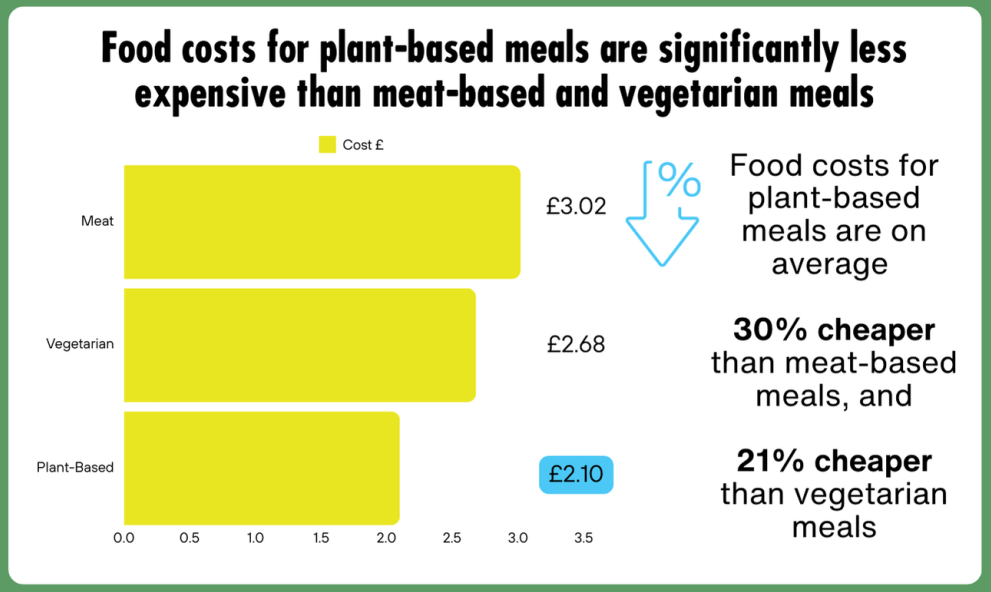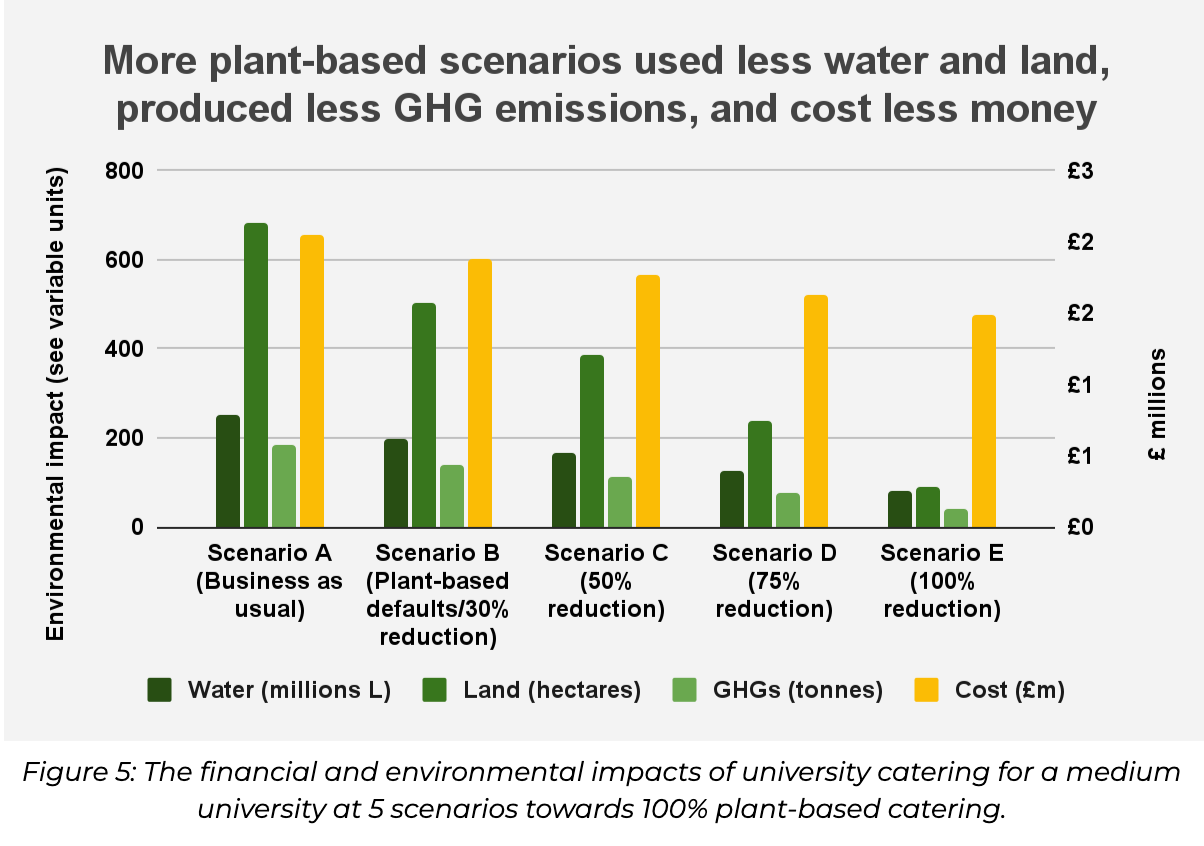If Universities Went Vegan, They Could Save As Much As £1.4M in Catering Costs & Cut Emissions by 80%
4 Mins Read
UK universities could benefit from massive cost and emissions savings if they switched to 100% plant-based catering, a new study has found.
If British universities transitioned to a fully vegan catering menu, they could save up to £1.5M annually and lower emissions by 80%, with meals using up a third of the water and nearly 90% less land.
This is because plant-based meals are 30% cheaper than meat and 21% cheaper than vegetarian dishes, while emitting 84% fewer greenhouse gases compared to meat-rich options, according to analysis by UK consultancy Bryant Research.
The firm compiled the climate impact data, wholesale price, and portion sizes of 140 different ingredients to estimate the environmental footprint and food procurement costs for a range of meals at universities.
“Our model found that plant-based meals are consistently the most sustainable across various environmental measures, compared to vegetarian and meat-based meals. Crucially, we also found that a plant-based transition provides an opportunity for caterers to reduce their food procurement costs,” Bryant Research director Chris Bryant and political researcher Billy Nicholles said in a joint statement.
Vegan meals much cheaper and better for the environment

The average costs and environmental footprints were calculated based on three weeks of sample menus, with one plant-based, vegetarian and meat-based meal each day, totalling 45 meals. The researchers found that the average price of a meat-rich dish was £3.02, versus £2.68 for vegetarian meals, and £2.10 for plant-based.
“All environmental measures demonstrated a clear and consistent trend: the plant-based meals performed better compared to meat-based and vegetarian meals, often by a significant margin,” the authors wrote.
In every example, vegan meals were associated with the lowest emissions. Even vegetarian meals generated three times as many emissions (1.5kg CO2e on average) as vegan options (0.5kg CO2e). Meat-based dishes were linked with 3.2kg of CO2e on average. For example, a beef lasagna with cheesy garlic bread, fries and a side salad emitted 11.4kg of CO2e, much higher than what a chestnut and oyster mushroom kebab with chips, pickled onions and chillies generated (0.5kg CO2e).
Similarly, plant-based fare used 69% less water (115 litres) than meat-heavy dishes (370 litres). But unlike other metrics, vegetarian dishes weren’t far away from the water footprint of meaty ones (350 litres). This is because dairy – and cheese, in particular – demand high volumes of water.
The greatest difference between vegan food and meat comes with land use. The average amount of land used to produce a meat-based meal is 12.3 cubic metres, versus 1.2 cubic metres for plant-based dishes – this means the former uses over 10 times as much land as the latter. Vegan lunches also need 73% less land than vegetarian ones.
This echoes other studies that show the outsized environmental impact of meat production. Livestock farming makes up 57% of agricultural emissions, while using up 80% of all farmland and 30% of the world’s freshwater supply – all while providing just 18% of the world’s calories and 38% of its protein.
How universities can embrace plant-based catering

The report worked out the total savings different-sized universities can make across five scenarios, ranging from business as usual to a transition towards a 100% plant-based menu.
These institutions can cut food procurement costs by 27% and reduce emissions by 79% if they transition to a fully vegan catering menu. The associated water consumption would also be decreased by 67%, while land use would be down by 87%.
A small university of 5,000 students could therefore save around £280,000 per year, which rises to £50,000 for a medium-sized institute of 10,000 students. For larger universities (up to 25,000 people), this would amount to £1.4M in budgetary savings.
To bring about these changes and reap their benefits, Bryant Reserach has outlined four recommendations for universities. First, they should publicly commit to a phased shift to a 100% plant-based menu by 2030, setting clear annual targets for increasing the proportion of such meals.
Then, they should engage and educate stakeholders, from Students’ Union leaders and prospective and current students to catering managers, commercial directors, chefs, and sustainability managers. The menu options they decide on should be “diverse, nutritious and appealing as well as environmentally and financially advantageous”.
The report also encourages them to implement a plant-based by default approach, which involves offering vegan dishes as the main choice, with meaty meals available if diners ask for them. This choice architecture strategy can normalise plant-based eating and is relatively easy to implement.
Finally, universities should utilise support services to increase the plant protein ratio, like Humane Society International’s Forward Food programme, which has already supported over 30 universities with hands-on culinary training, evidence-backed menu formulation strategies, and bespoke food sustainability reports.
Caterers like Sodexo and Compass Group have both pledged to reduce meat and dairy in favour of vegan meals to meet their climate commitments. And last year, over 650 academics and campaigners penned an open letter to UK universities demanding a switch to 100% vegan catering menus, comparing the shift to fossil fuel divestment commitments by 101 institutes in the country.
So far, the students’ unions of the University of Stirling, Birmingham University, Queen Mary University, London Metropolitan University, Kent University, Cambridge University, and Newcastle University, among others have all voted to introduce 100% plant-based menus.



